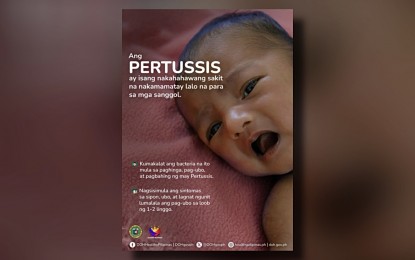
PREVENTION. The Department of Health (DOH) campaign material to fight pertussis. The DOH regional office in Eastern Visayas has asked local health offices to heighten surveillance and monitoring against pertussis, with five suspected cases of this highly contagious respiratory tract infection in the region. (Photo courtesy of DOH)
TACLOBAN CITY – The Department of Health regional office here has asked local health offices to heighten surveillance and monitoring against pertussis, with five suspected cases of this highly contagious respiratory tract infection in the region.
The DOH regional epidemiology and surveillance unit reported that these suspected cases are in Leyte, Southern Leyte, and Eastern Samar provinces.
Jelyn Lopez-Malibago, DOH regional information officer, said in a text message that the reported cases are just suspected since there is no confirmed case of pertussis or whooping cough in the region.
The regional office will send samples to the Research Institute for Tropical Medicine for confirmatory testing.
“In reference to the declared pertussis outbreak in Quezon City, the DOH Eastern Visayas Center for Health Development is heightening surveillance and monitoring to ensure the protection of public health and the well-being of our communities within the region,” the DOH said in its advisory issued Tuesday.
Pertussis is caused by the bacterium Bordetella pertussis, resulting in a highly contagious respiratory infection and transmitted through person-to-person respiratory droplets or contact with airborne droplets.
Symptoms include a persistent cough that lasts for two or more weeks, a mild fever, and a runny nose.
Pertussis is most contagious up to about three weeks after the cough begins, and many children who contract the infection have coughing spells that last four to eight weeks.
The DPT (diphtheria, tetanus, and pertussis) vaccination administered to children as part of their primary routine immunization helps prevent the possibility of severe pertussis. (PNA)
